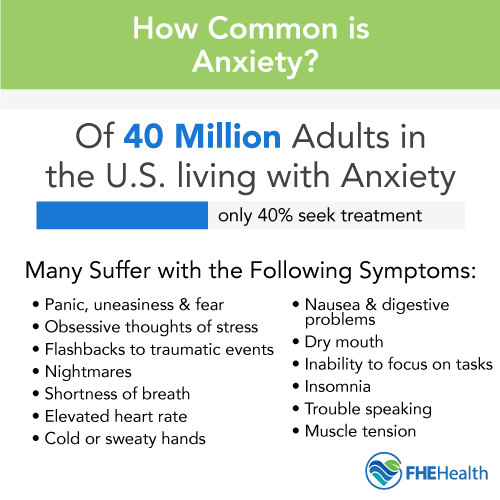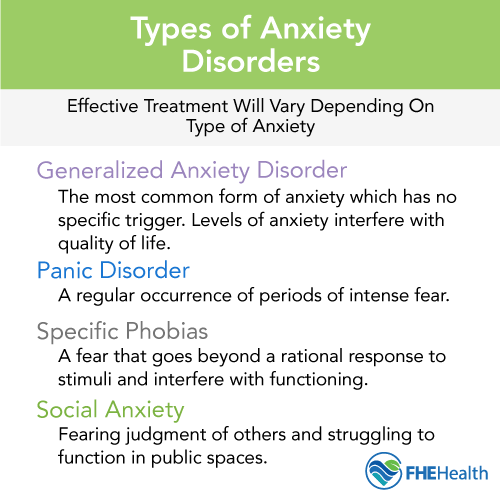
We’ve all been there: Your boss wants to meet with you in his office or your significant other says they need to talk, and a sudden chill washes over your body. Your mouth gets dry and your heart starts racing. You’re experiencing anxiety.
Anxiety is a universal human emotion, a normal part of being alive, and an important survival mechanism, according to behavioral experts. It often serves as a healthy self-preservation cue. It’s how our animal mind once protected us from dangerous predators and today helps us avoid reckless, high-risk situations.
But for an estimated 19.1 percent of the U.S. population who suffer from an anxiety disorder, anxiety can be crippling to the degree that it significantly interferes with daily life. If that describes you, know that you’re not alone. Anxiety disorders are the most common mental health condition in this country. They are also highly treatable—but before deciding to pursue individual therapy or a more intensive inpatient program, the following questions are worth considering.
What Is Anxiety vs. an Anxiety Disorder?

What’s the difference between your more garden-variety anxiety and the type that’s diagnosable? Anxiety is the sensation of fear, nervousness, and stress that occurs when we feel threatened, uneasy, or worried about the outcome of a situation. In circumstances like those described above—a boss demanding a sit-down meeting or a partner sending break-up cues—anxious feelings are natural and to be expected. These feelings are part of a classic stress response, the “fight or flight response” handed down to us by our earliest ancestors across years of evolution.
For some people, though, anxiety does not function in this way and can take more extreme and/or more generalized forms that have nothing to do with actual threats to their survival. For example, someone with an anxiety disorder might be afraid to speak to people in general—not just a supervisor demanding to speak with them. Or, they may harbor extreme and irrational fears—of germs, for instance—that take over their daily life.
In these instances, an anxiety disorder—not just an anxious episode triggered by an understandably stressful situation—is likely at play. Anxiety disorders are characterized by excessive levels of anxiousness that can make it hard to manage day-to-day activities at home, work, and school. In some situations, an anxiety disorder can be very debilitating and needs to be understood and accepted in the same way that other mental or physical disabilities are—as serious medical conditions that are treatable and warrant immediate help.
What Causes Anxiety Disorders?
As with many mental disorders, there is no one cause behind anxiety, and doctors are still studying the different elements that can trigger a diagnosis. Whatever the cause(s) of an anxiety disorder may be, chronic and pervasive anxiety is never the result of a personal failing or character flaw.
Other Contributing Factors for Anxiety
Anxiety disorders can be attributed to a number of factors, including past experiences, genetic and environmental influences, and chemical imbalances in the brain. For many people, it’s a combination of these things that leads to an anxiety disorder.

Medical causes are very common. A person may have an underlying health problem that makes them anxious and afraid. This is quite common in people diagnosed with heart disease, thyroid problems, or diabetes, for example.
Certain life experiences cause anxiety to develop. You may fear a situation or specific outcome because you’ve experienced it before or you’ve seen someone else go through it. Trauma is often a trigger for anxiety.
Intensely stressful situations, the buildup of moderate stress over time, and the routine use of drugs and alcohol increase the risks of developing an anxiety disorder. Some people also have a personality that makes them more prone to feeling anxious than others.
Are Anxiety Disorders Genetic?
There is some evidence that people with a family history of anxiety disorders are more likely to suffer from them. However, genetics isn’t the only cause for most people. In some cases, a genetic predisposition can increase the intensity of symptoms in those who may have developed anxiety because of another issue, such as an abusive childhood.
Co-Occurring Disorders
Co-occurring disorders like depression can be brought on by and also be the cause of anxiety disorders. For example, a person with bipolar disorder may recognize what their manic episodes look like to other people and, consequently, develops anxiety or panic attacks over having such an episode. Any other type of mental health disorder can make you more prone to anxiety.
What Are the Types of Anxiety Disorders?
There are numerous types of anxiety disorders. Anxiety disorders can be classified in a few different ways based on their unique manifestations. These are the major types of anxiety disorders:
Generalized Anxiety Disorder (GAD)
Generalized anxiety disorder (GAD) refers to chronic anxiety and obsessive worry that occur without a known trigger. Those with GAD may find themselves panicking in everyday situations in a way that interferes with their quality of life. Generalized anxiety is the most commonly occurring anxiety disorder but can be hard to recognize because of its non-specific cause(s).
Obsessive-Compulsive Disorder (OCD)
Obsessive-compulsive disorder (OCD) is characterized by recurring, unpleasant thoughts or obsessions and/or compulsive, repetitive behaviors. Examples of these “ritualistic” behaviors include handwashing, counting, or checking. A person with OCD feels compelled to perform these actions as a way to keep their obsessive thoughts at bay—but these rituals provide temporary relief at most and only reinforce a disturbing cycle of anxiety.
Panic Disorder
Panic disorder is the name for what happens when a person has multiple and ongoing panic attacks with no explainable cause. A panic attack is an episode of intense terror that causes a physical response like shaking, trouble breathing, confusion, dizziness, or rapid heart rate, and can occur after a traumatic event, even to those without an anxiety disorder. However, when panic attacks do not have a specific trigger or persist for long periods of time after an experience of trauma, a panic disorder may be at the root of ongoing symptoms.
Social Phobia/Social Anxiety Disorder
Social anxiety usually entails intense self-consciousness in the presence of other people during ordinary, everyday interactions. The feelings associated with social anxiety are often wide-ranging and can extend from struggles with intimacy to fears of speaking with strangers. Those with social anxiety may struggle to make friends, speak up at work, or otherwise interact normally with peers.
Other Phobias
Social anxiety disorder is just one of many phobias that also qualify as anxiety disorders. Because people will often go out of their way to avoid their fear, phobias can drastically alter the ways in which people live. Many people are afraid of potentially dangerous situations, like falling from a great height or getting caught in a fire, but when these fears go above and beyond a rational response, particularly in safe situations, their response may be classified as a phobia.
As overblown fears, many phobias contain a seed of logic. For example, a fear of flying isn’t totally irrational, insofar as planes do occasionally crash, killing people. But some phobias aren’t rational at all. Agoraphobia, or a fear of crowds and open spaces, is one example.
Post-Traumatic Stress Disorder (PTSD)
PTSD is an anxiety disorder triggered by exposure to a traumatic event, such as an accident, disaster, violent assault, or combat. Sometimes in the wake of a frightening event, the normal “fight or flight response” can go haywire and start to misfire. When that happens, a person may experience symptoms of increased arousal (trouble sleeping, poor concentration, an inability to sit still and be calm, exaggerated anger responses, etc.). They may also experience flashbacks and nightmares and go out of their way to avoid reminders of the trauma.
How an Anxiety Disorder Can Negatively Affect Your Life
An anxiety disorder that goes unchecked can have many negative effects, creating challenges in virtually every aspect of one’s life. Depending on the disorder in question, anxiety can make it hard to do almost anything, from creating meaningful relationships with others to succeeding in the workplace.
When everyday situations cause anxiety, it can be hard to interact with others in a normal way. This can cause problems at work and unnecessary stress in relationships, leading to an inability to achieve goals and live a happy, healthy life.
A little anxiety can be a good thing, motivating a person to make safe choices and even achieve new goals towards greater self-growth. When anxiety is chronic and debilitating, though, its mental, social, and physical health effects can include:
- Depression and other mental health disorders
- Difficulty sleeping
- Substance misuse
- Social isolation
- Headaches
- Chronic pain
- Digestive and bowel complications
Anxiety can also increase the risk of having suicidal thoughts or actions.
How Do I Know if I Have an Anxiety Disorder?
Anyone struggling with anxiety over an extended period of weeks, months, or even years needs to know that they may have a disorder that can be effectively treated and managed. The first step in getting anxiety under control is to seek the help of a doctor or mental health professional who can diagnose the condition. After a full psychiatric/psychological evaluation that takes into account all of the symptoms and behaviors you’re experiencing, they should be able to tell you if you have an anxiety disorder and what it is.
This checklist can help you determine whether you are experiencing problematic symptoms that should be evaluated by a physician.

- Do you worry excessively, even about mundane or routine events like driving to work or shopping for groceries?
- Are you consistently agitated to the point that it’s hard to focus?
- Are you restless or on edge, even when undertaking standard parts of your daily routine?
- Are you regularly tired after an undemanding day?
- Do you have trouble concentrating on tasks at work, at school or at home?
- Are you irritable without any particular triggers?
- Do you find yourself with tense muscles, like a clenched jaw or elevated shoulders?
- Do you have trouble falling asleep or staying asleep?
- Do you avoid social situations or other triggers due to previous experiences with anxiety?
Treatments for Anxiety Disorders
As is the case with other mental and physical illnesses, treatment can significantly improve the quality of daily life for those living with anxiety. Just some of the many treatments that can help you successfully manage an anxiety disorder include:
- Cognitive-behavior therapy: This form of therapy helps identify negative thoughts that may bring on an attack in order to effectively challenge the pattern and relieve the anxious feelings associated with it.
- Exposure therapy: Exposure therapy encourages the individual to confront the fear and, through repeated confrontations, learn to cope with previously stressful situations.
- Medications: When therapy alone isn’t effective, medication can be prescribed to temper the symptoms of an anxiety disorder. Antidepressants and benzodiazepines are common medications for treating anxiety disorders.
At FHE Health, we are an innovative leader in treatments for anxiety, offering cutting-edge approaches that integrate the medical, psychiatric, and clinical components of care. We firmly believe that the success of mental health treatment should be quantifiable. For this reason, alongside traditional medical and clinical treatment approaches, we offer a neuro-rehabilitative treatment program that includes:
- Comprehensive neuropsychological testing
- Heart rate variability and biosound monitoring
- Quantitative electroencephalography (qEEG)
- QEEG-guided neurofeedback training
- Electrical nerve stimulation therapy
- High-frequency pulsed electromagnetic stimulation therapy
- Deep brain stimulation therapy
- Computerized cognitive brain training
Help for Anxiety Now
If you or someone you love is facing anxiety, help is available. The right diagnosis and combination of treatments can be extremely effective in alleviating symptoms and promoting a healthier and happier way of life.
Don’t let debilitating anxiety ruin one more day. Call us now at 833-596-3502. We can help you take back your life.








